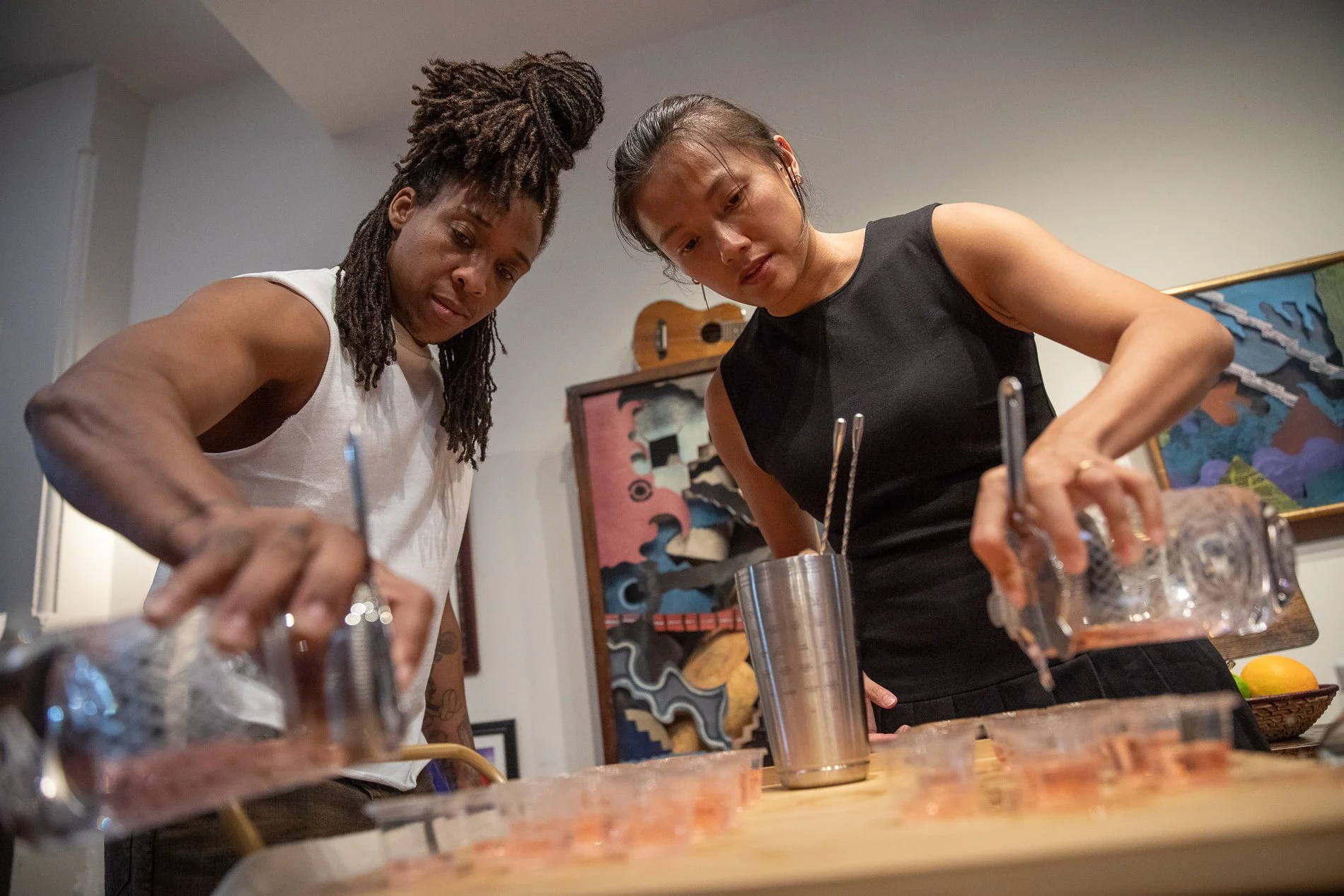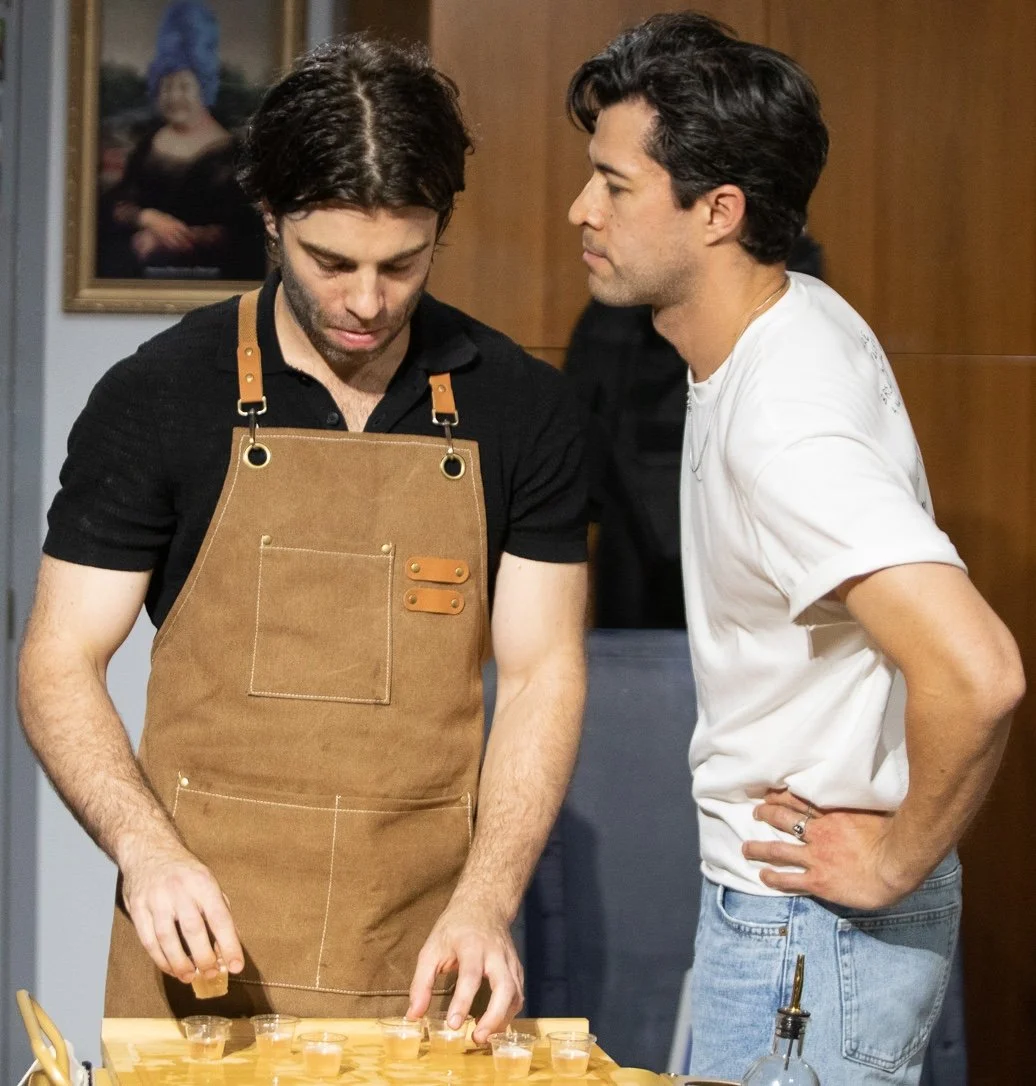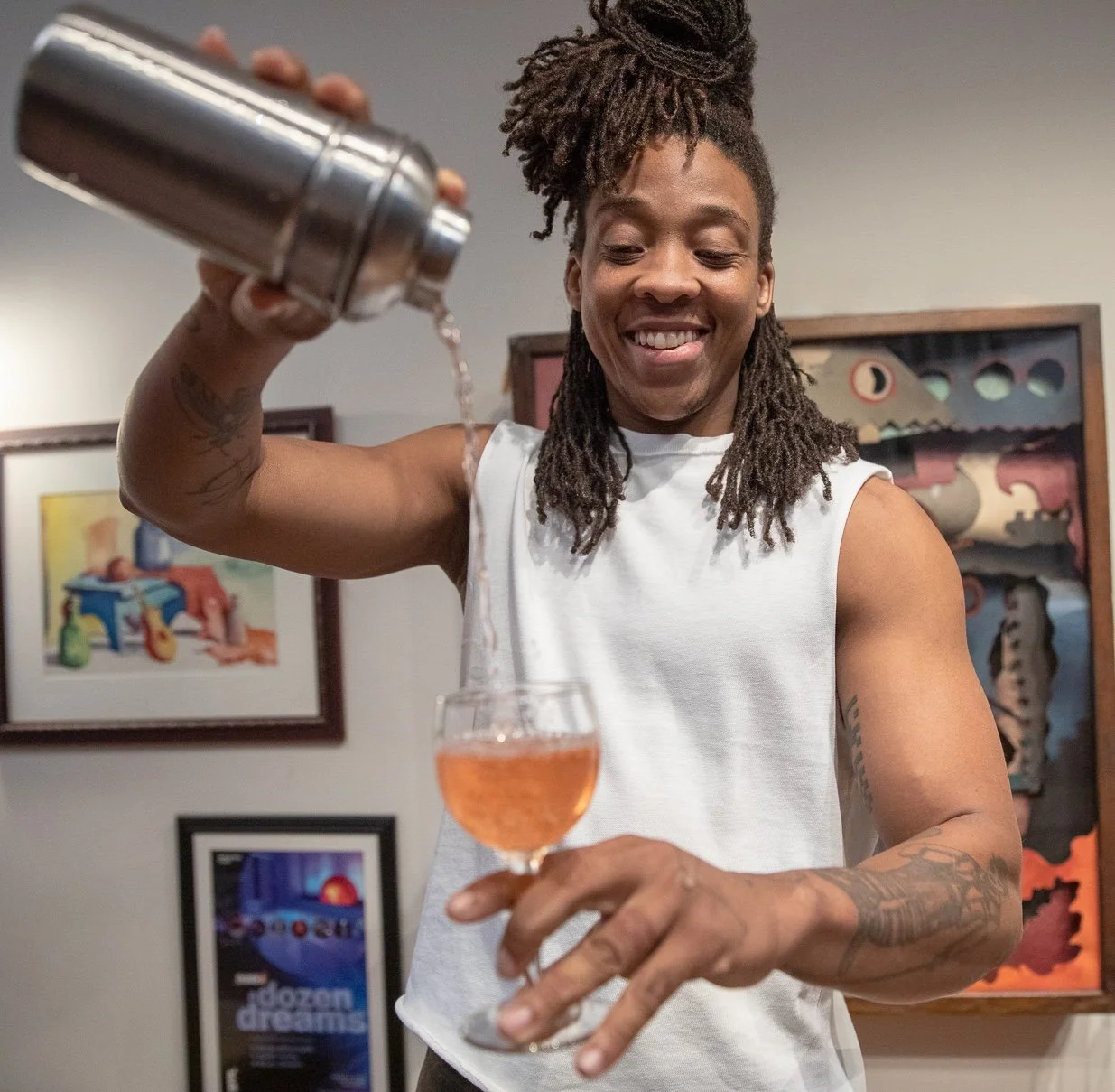In Last Call, A Play with Cocktails, Esco Jouléy (left) and Dorcas Leung fill cups for a “shot-off,” a competition with the winner determined by audience vote.
The 30–40 guests attending each performance of Last Call, A Play with Cocktails know they’re going to immersive theater, but they may not expect that what they’ll be immersed in are marriage counseling and an authoritarian dystopia.
This wholly original production does offer the bespoke cocktail experience and conversational salon that marketing materials suggest. It just goes somewhere much darker over the course of its 90 minutes, creating a unique and multifaceted story line that hits at emotions of love, loss, anger, and regret.
Chris Bannow (left) and Mitchell Winter portray Last Call’s two characters at certain performances.
Last Call is presented by En Garde Arts, a veteran producer of site-specific theater, often with historical or sociocultural themes (their last major production was staged on a barge turned maritime museum, docked in Red Hook, Brooklyn). The play was written by Hansol Jung and codirected by Jung and Dustin Willis—the writer and director, respectively, of the 2022–23 critical hit Wolf Play. Willis and Jung are members of The Pack, a new theater artists collective, which has partnered with En Garde, founded in 1985, on the show.
Last Call is performed in the apartment of an En Garde or Pack associate or friend; 10 different homes will be used during the run. The play also has a rotating two-person cast, with the main character, Tender—that’s a job, not a name—played by either Dorcas Leung, Chris Bannow, or Nicole Villamil, and Other Tender portrayed by Esco Jouléy, Mitchell Winter, or Brian Quijada. The characters have the same names as the actors playing them.
Ticket buyers receive a password to gain admittance to the apartment, and they’re offered wine, beer, and sparkling water upon arrival. Tender (Dorcas at the performance I attended) uses the password too, right before she enters the home in a mailbox costume—which she needs because nobody’s allowed to be outside in the evening. She removes a bulletproof vest and night-vision goggles along with her disguise, and then starts unpacking her bartending supplies.
Jouléy shows off skills and charm as Other Tender in Last Call.
This gathering, it turns out, is an “underground” cocktail party. Dorcas and her late husband started doing them “after the lockdown eased into 6 p.m. curfews.” A note given to attendees assures them that these events “have never been compromised nor reported to authorities” and that “the venue is protected from curfew police by private security guards.”
As she’s mixing up drinks, Dorcas continues to make offhand remarks about the state of the country—“governmental ban,” riots, three million dead in a year, “how they’ve been locking up curfew breakers lately,” “hooray us who survived, hooray us who defied the odds”—and about her husband and marriage. She also shares cocktail history, as well as her opinions on recipes and ingredients (Peychaud versus Angostura bitters, for example).
And she occasionally goes off on a tangent, such as the one about how transcendentalism—“the first philosophical offer to the world from our great nation, the bedrock of American thought”—and its emphasis on an individual’s intuitive truths led to a nation where “empirical evidence is less true than gut feeling.”
About half the attendees receive a cocktail or shot, usually for answering a trivia question. Others might be asked to sniff a liqueur for its herbal content, to banter about personal matters, or even to get up and dance. And the audience, unknowingly, determines the ending of the play.
Leung is one of three actors who rotate in the Tender role. Photos by Fred Charles.
So this is full-throttle interactive theater. Yet beyond its immersive element of the cocktail presentation/party, Last Call grabs audience members with finely detailed characters and plot points. Jung’s script is peppered with moving insights about romance and heartbreak, about forging on in a tumultuous relationship, and about societal breakdown.
The actors’ work is, pardon the bar pun, top-shelf. Leung’s ability to continually prepare a variety of drinks—with all the confidence, panache, and oversize ice cubes of a real bartender—while she’s chattering away is truly impressive. Jouléy, who played Other Tender at the performance I saw, does so as well, but for a shorter amount of time.
Both performers thoroughly connect with their characters on a personal and emotional level, too, embodying very distinct personalities. Dorcas is friendly and enthusiastic yet seems like she’s suppressing sorrow and other bad feelings. Esco is full of swagger, smooth, a real player but affable. These fictional people and the entire world that Last Call summons feel authentic.
By the end of the evening, audience members may be chilled—by the ice in their drink or by the disquieting revelations about Tender’s marriage they’ve been privy to. This Play with Cocktails engages its audience in many different ways.
Last Call, A Play with Cocktails runs through Oct. 13 at private apartments in Manhattan and Brooklyn (address provided after booking). Evening performances are at 7 p.m. Thursday through Monday, with matinees at 3 p.m. on Sundays in October. For tickets and more information, visit engardearts.org.
Playwright: Hansol Jung
Directors: Hansol Jung and Dustin Willis
Dramaturg & Mixologist: Lexy Leuszler
Costume Consultant: Hollie van Osenbruggen
Bartending Consultant: Yunhee Yang






